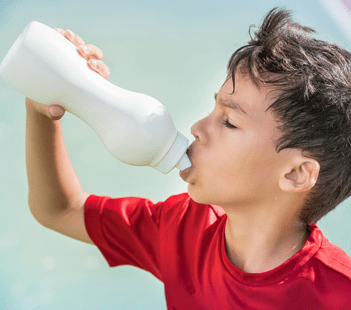Heat, Sun & UV Safety Tips
January 01, 2017
Beat the heat with these tips from Denver Health. Beating the heat can be challenging when temperatures approach 100º F.
- Stay inside during the hottest hours of the day - mid morning to mid afternoon.
- Dress lightly.
- Drink plenty of water and other fluids - at least a gallon of liquid per day, preferably water.
- Avoid drinking alcohol and beverages that are carbonated or contain caffeine when temperatures are high, as they can lead to dehydration.
- Try to stay in relatively cool areas, even when outside. Many public places, such as libraries, shopping malls and movie theatres, are air conditioned.
- Keep blinds and curtains closed from morning until the late afternoon to block extra direct heat from sunlight.
- Move your exercise routine to early morning or later in the evening. Be aware of the heat. Pay attention to it and modify your activities appropriately.
- Always take children and pets out of a in the car in hot conditions while you run to do a quick errand. Animals and children succumb to heat exposure and death very quickly in a hot car.
- Properly supervise children during outdoor play, being sure to monitor them closely and frequently.
- Watch for and avoid metal playgrounds. Metal slides can burn children.
- Seek medical care right away if you become nauseous, start vomiting or experience cramps.
- Use a fan. Place the fan so that it blows in the room and pushes hot air out the window.
- Use small appliances like slow cookers and tabletop grills rather than your traditional oven or stove to keep kitchen heat to a minimum.
- Verify that seat belts and car seat restraints are not too hot before buckling yourself or anyone else into a car.
Recognizing Heat-Related Health Problems
It's important to recognize the signs of heat exhaustion and heat exposure. Sign of Heat Exhaustion come first, followed by Heat Stroke.
Heat Exhaustion
- Breathing that is shallow and fast
- Clammy skin
- Dizziness
- Dry mouth
- Excessive sweating
- Fainting
- Headache
- Loss of color in skin
- Nausea
- Pale complexion
- Pulse that is fast and weak
- Skin that feels moist and cool (when touched)
- Sweating
- Tiredness
- Vomiting
What To Do
Get out of the heat immediately. Provide cool fluids and wipe down the person with cool cloths.
Heat Stroke
Heat stroke always requires medical attention. If you see any of the above exposure signs, get the person out of the heat immediately and take them to the nearest hospital or call 911.
- Dizziness
- Extremely high body temperature (over 103 degrees F)
- Headache that is throbbing
- Lack of sweating
- Nausea
- Rapid pulse that is strong
- Red skin that is hot and dry (when touched)
Manage Your Healthcare From Anywhere, At Any Time
Create a New Account
Existing MyChart Account



